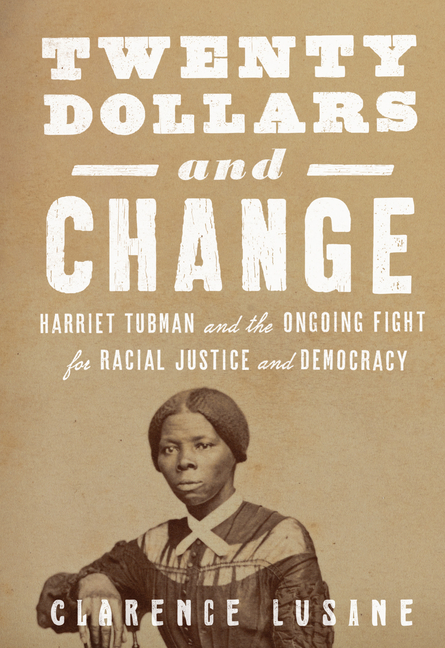"A timely political and historical study of racism in America, Twenty Dollars and Change: Harriet Tubman and the Ongoing Fight for Racial Justice and Democracy is informatively enhanced with the inclusion of fifty-two pages of Notes and a fourteen page Index. Of particular relevance and unreservedly recommended for personal, professional, community, college, and university library Contemporary Social Issues, African-American Racial/Political History, and African/American Demographic Studies collections and supplemental curriculum studies lists, it should be noted for the personal reading lists of students, academia, political activists, governmental policy makers, and non-specialist general readers with an interest in the subject that Twenty Dollars and Change: Harriet Tubman and the Ongoing Fight for Racial Justice and Democracy is also available in a digital book format."–Midwest Book Review
"Dr. Clarence Lusane's recently published Twenty Dollars and Change: Harriett Tubman and the Ongoing Fight for Racial Justice and Democracy, walks us through the history of the faces that adorn American currency and all the arguments for and against Tubman's ascension to be the face of the twenty. He adroitly covers a vast historical landscape with poetry and precision and places the "Tubman Debate" into the context of current racial hierarchies and politics."–Romi Mahajan, Countercurrents
"Thoughtfully balanced and nuanced, Twenty Dollars and Change explores the ways that American hero and national icon Harriet Tubman resonates across racial, gender, and political divides. Lusane captures not only the significance of historic symbols, but how winning the fight over representation and memory advances the ongoing struggles for racial justice and democracy right now." –Janell Hobson, editor of Ms. Magazine's Harriet Tubman Bicentennial Project and author of When God Lost Her Tongue: Historical Consciousness and the Black Feminist Imagination
"Twenty Dollars and Change offers a metaphor about two Americas: one striving to live up to its promise of justice and liberty, and the other mired in the bloody legacy of white supremacy. The historical arc Lusane provides demonstrates that the freedom struggle changes its cast of characters over time, but never forsakes its hope for liberation. A great and refreshing read."–Loretta Ross, author of Calling In the Calling Out Culture
"Twenty Dollars and Change travels the back alleys of fear of racist white America. . . .Harriet Tubman's image on the money is an opportunity to establish the symbol of democracy she wanted, one where actions led by a conceived idea of being inferior or superior are crushed. Clarence Lusane has put it where the goats can get it. An extraordinary and wonderful book."–Tina Wyatt, great-great-great grandniece of Harriet Tubman, co-founder of Harriet Tubman Day, Washington D.C.
"In this original and brilliantly conceived book, acclaimed political
scientist Clarence Lusane offers an incisive analysis of how racism and
inequality shaped–and continues to shape–American society."–Keisha N. Blain, coeditor, Four Hundred Souls: A Community History of African America, 1619-2019
"Twenty Dollars and Change is a future-gazing guide to who we must be to become who we claim to be." –Kali Holloway, columnist for The Nation and The Daily Beast (from the foreword)
"Urgent and inspiring, Twenty Dollars and Change should compel the U.S. Treasury to make real our core value of equality for all with currency images that honor the contributions and humanity of African Americans, Native Americans, women, and all marginalized people of this country. Dr. Lusane sees Tubman as a Founding Mother of American democracy yet to come, and offers a persuasive case how a new twenty and change can get us there sooner."–Barbara Ortiz Howard, Founder of "Women on 20s"
"Twenty Dollars and Change offers powerful analyses of race and U.S. history and our present crucible moment. . . . A must read." –Barbara Ransby, author of Making All Black Lives Matter: Reimagining Freedom in the Twenty-First Century
"As challenges to racial justice, women's rights, and democracy itself intensify, Lusane's sober and historically rooted analysis provides much needed clarity and insight. . . .Twenty Dollars and Change is exactly the book we need at this moment."–Karen Bass, Mayor of Los Angeles, CA
"Clarence Lusane reminds us that we all can contribute enormously to a more perfect society based on the dignity, diversity, and democracy of the peoples. In that spirit, and with great clarity and integrity, Lusane calls on us to wake up, fight back, and never back down until justice prevails." –Suzan Shown Harjo (Cheyenne Hodulgee Muscogee), Writer, Editor, Curator, Native Indigenous Rights Advocate, and Recipient of the Presidential Medal of Freedom
"Lusane teaches us of the starkly contrasting lives of Tubman and Jackson, and captures blow-by-blow the intricacies of the struggles over changing currency before connecting them to broader ones in the moment of Donald Trump and George Floyd."–David Roediger, author of Working Toward Whiteness: How America's Immigrants Became White
"Clarence Lusane's Twenty Dollars and Change is truly impressive–a genuinely sweeping work." –Tom Engelhardt, editor of TomDispatch, and author of A Nation Unmade by War






